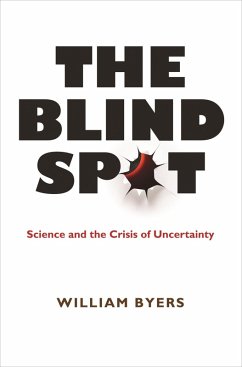Why absolute certainty is impossible in science
In today's unpredictable and chaotic world, we look to science to provide certainty and answers-and often blame it when things go wrong. The Blind Spot reveals why our faith in scientific certainty is a dangerous illusion, and how only by embracing science's inherent ambiguities and paradoxes can we truly appreciate its beauty and harness its potential.
Crackling with insights into our most perplexing contemporary dilemmas, from climate change to the global financial meltdown, this book challenges our most sacredly held beliefs about science, technology, and progress. At the same time, it shows how the secret to better science can be found where we least expect it-in the uncertain, the ambiguous, and the inevitably unpredictable. William Byers explains why the subjective element in scientific inquiry is in fact what makes it so dynamic, and deftly balances the need for certainty and rigor in science with the equally important need for creativity, freedom, and downright wonder. Drawing on an array of fascinating examples-from Wall Street's overreliance on algorithms to provide certainty in uncertain markets, to undecidable problems in mathematics and computer science, to Georg Cantor's paradoxical but true assertion about infinity-Byers demonstrates how we can and must learn from the existence of blind spots in our scientific and mathematical understanding.
The Blind Spot offers an entirely new way of thinking about science, one that highlights its strengths and limitations, its unrealized promise, and, above all, its unavoidable ambiguity. It also points to a more sophisticated approach to the most intractable problems of our time.
In today's unpredictable and chaotic world, we look to science to provide certainty and answers-and often blame it when things go wrong. The Blind Spot reveals why our faith in scientific certainty is a dangerous illusion, and how only by embracing science's inherent ambiguities and paradoxes can we truly appreciate its beauty and harness its potential.
Crackling with insights into our most perplexing contemporary dilemmas, from climate change to the global financial meltdown, this book challenges our most sacredly held beliefs about science, technology, and progress. At the same time, it shows how the secret to better science can be found where we least expect it-in the uncertain, the ambiguous, and the inevitably unpredictable. William Byers explains why the subjective element in scientific inquiry is in fact what makes it so dynamic, and deftly balances the need for certainty and rigor in science with the equally important need for creativity, freedom, and downright wonder. Drawing on an array of fascinating examples-from Wall Street's overreliance on algorithms to provide certainty in uncertain markets, to undecidable problems in mathematics and computer science, to Georg Cantor's paradoxical but true assertion about infinity-Byers demonstrates how we can and must learn from the existence of blind spots in our scientific and mathematical understanding.
The Blind Spot offers an entirely new way of thinking about science, one that highlights its strengths and limitations, its unrealized promise, and, above all, its unavoidable ambiguity. It also points to a more sophisticated approach to the most intractable problems of our time.


